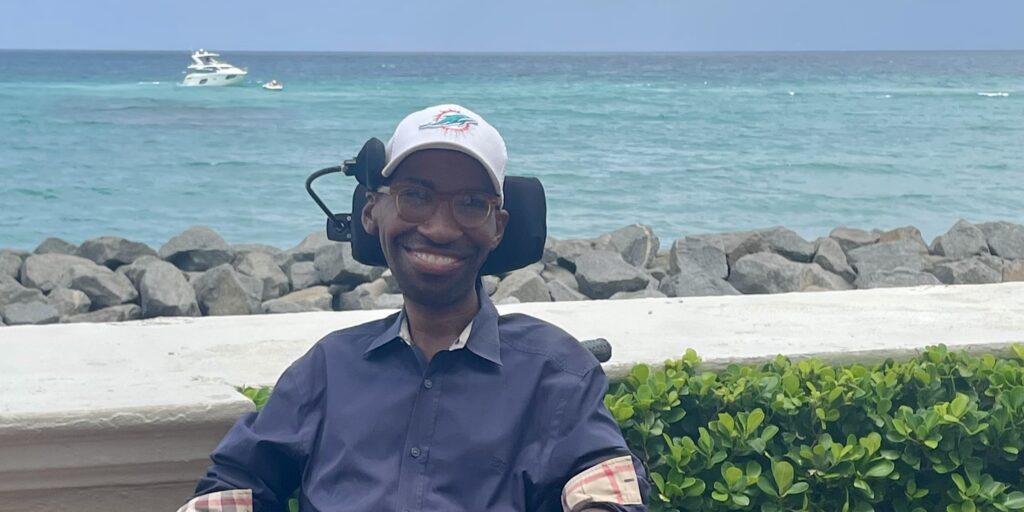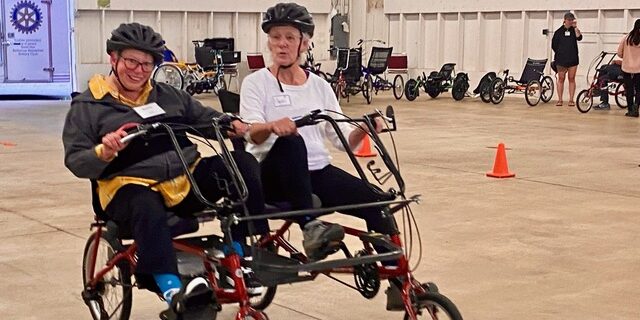
How to Help Your Child Make Friends in School
By Claire Sykes | Tuesday, August 8, 2023
Making friends in school isn’t always easy for kids at any age, especially those with neuromuscular diseases and physical disabilities. But with the right mindset and some guidance, they can form healthy and fulfilling social ties.
The benefits of buddies
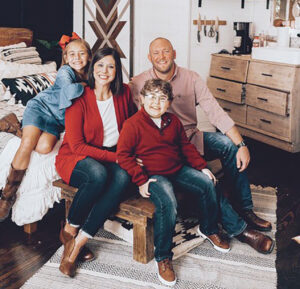
Josh LyBrand (right) with his family, including Ethan (center)
Positive peer relationships offer emotional support and a sense of belonging, and help boost self-esteem and social and academic skills. They also can lessen negative thoughts, anxieties, depression, and loneliness, and shield against bullying. Plus, they’re just plain fun.
“You need friends you can talk to and not feel judged, who are on your side and there for you,” says Josh LyBrand of Decatur, Alabama, a special education middle school teacher. His son, Ethan, 14, lives with Duchenne muscular dystrophy (DMD). “If I’m having a rough day, I can tell a friend,
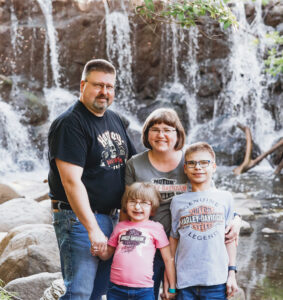
Siblings Holly (left) and Josh (right) Szymczak with their parents
and that makes my day a lot better,” Ethan says. The kids he confides in also give him confidence. “They don’t see my wheelchair first. This makes me act more positively, and then I share that positivity with others,” he says.
Friends are also important for Holly Szymczak, 15, and her brother Josh, 18, who live with limb-girdle muscular dystrophy (LGMD) near Milwaukee, Wisconsin. “My friends push me in my chair and give me treats,” Holly says. Josh also gets help from friends: “They help me carry my backpack. They care about me,” he says. Their mother, Denise, adds, “Their friends include them in activities and help them if they see them struggling.”
Overcoming obstacles
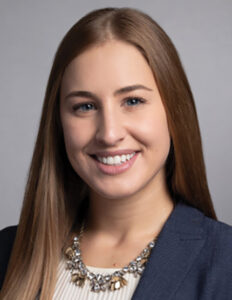
Areti Vassilopoulos, PhD
Areti Vassilopoulos, PhD, a pediatric psychologist at the MDA Care Center at Yale School of Medicine, points out that growing up with a neuromuscular disease presents unique challenges that can affect kids’ abilities and opportunities to make friends. “Most kids progress in a typically expansive way, while those with neuromuscular diseases can face increasing social challenges,” she says. “Medical appointments and hospital stays can make them miss school and fall behind.”
In some cases, developmental delays play a role. Abby Loch, 16, who is a manifesting carrier of DMD, is “very chatty, fun, and loving,” says her mother, Melissa,
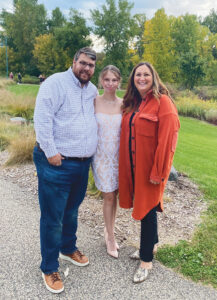
Abby Loch (center) with her parents
of Apple Valley, Minnesota. “But the social and academic gap between her and her peers has gotten larger. It’s been hard for her to find true friends who are nonjudgmental and meet her where she is.”
The degree of difficulty for a kid to make friends “depends on the type and severity of their disease, their personality, how they view friendships and the challenges with them,” says Natalie Truba, PhD, a psychologist at the MDA Care Center at Nationwide Children’s Hospital in Columbus, Ohio.
A child’s disease is out of your control, but you can influence their perceptions of it and how it impacts them. Techniques to help a child make friends vary with their age and stage in life. Here is a guide to adjusting your approach as they progress through school, keeping in mind that each child develops at their own rate.
Elementary school: Build a foundation
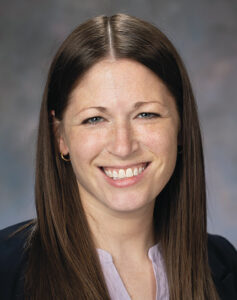
Natalie Truba, PhD
“There’s so much adult scaffolding in elementary school,” Dr. Truba says. “Prescribing friendships to kids and teaching them the skills to be good humans are two important aspects of childhood learning that are carried into adulthood.”
Experts recommend starting early, taking children to playgrounds and inviting their friends to playdates. Together, read books about friendship and role-play social situations, such as asking someone to play or share a toy.
Middle school: Let them figure it out
Get middle-schoolers involved in after-school activities, clubs, and MDA Summer Camp to meet other kids. They may struggle with rejection, conflict, and awkwardness at times, but don’t be too quick to rescue them. “Children need to learn on their own, or they could be less prepared to navigate friendships as adults,” Dr. Truba says. “Instead, help them cultivate the attitude that building new skills may feel uncomfortable for a while but will grow easier with practice.”
You can remain involved by keeping an open dialogue with your child. “Truly listen so they really feel heard before you offer advice,” Dr. Vassilopoulos says.
By middle school, kids turn more to their peers than parents, but they may still need your support to handle others’ curiosity about their differences. Dr. Vassilopoulos suggests they practice a response such as, “I have trouble moving my legs and arms, and I see doctors for that,” or “It’s hard for me to talk about it, but you can look up ‘muscular dystrophy’ on the internet.’’
When asked about his wheelchair, Ethan simply says, “My legs don’t work like they used to,” and that works.
High school: Follow their interests
Older kids’ hobbies and pursuits deepen and change. Support them. For example, Josh has made friends in school by joining the golf team and finding other kids who enjoy going to movies.
In this stage, social dynamics also become more complex as kids solidify their own identities and give friendships greater importance. “Kids are learning more from experience about navigating conflict, fitting in, and falling out of peer groups,” Dr. Vassilopoulos says. They may need adults less, but you can always be there for them.
10 tips for making friends
Experts and MDA community members offer their top tips to make friends:
- 1.Love yourself. That’s the advice Abby offers younger kids. “It took me a long time to get where I am with that,” she says. “Now, when I look in the mirror, I think of four things I love about myself.”
- Welcome others. “Try not to let fear of rejection get in the way,” Dr. Vassilopoulos says. Instead, be curious, open, and willing to reach out to others. Holly starts with a simple greeting. “I say hi first, and then they say it back,” she says.
- Share similar interests. Holly has made friends in her ballet class and bowling. Ethan enjoys social video games and acting in local children’s theater plays.
- Be yourself. “I don’t try to change how I act to fit in. If you’re true to yourself, you’ll have more true friends,” Ethan says.
- Ask questions. When Abby talks about a new friend, her parents encourage her to think through some questions: How does this person make me feel? Why do I want them as a friend? “We’re helping to foster positive friends for her and steer her from those who aren’t,” Melissa says.
- Choose wisely. A good friend is open, honest, and responsive. “We explain to Ethan to notice how people also treat others,” Josh says. Ethan adds, “If they aren’t just as positive and kind to others, hanging out with them isn’t worth it to me.”
- Be a good friend. “I’m kind and respectful and there for the people around me,” says Ethan. For Abby, “being that ‘shoulder’ for someone makes me happy knowing I’m making someone else happy,” she says.
- Sharpen your social skills. Dr. Truba suggests kids attend MDA Summer Camp or volunteer somewhere like a nursing home. This provides practice in a welcoming setting.
- Know what’s right for you. We don’t all need the same level of social interaction. “Some kids want to see multiple friends many times a week, and for others, a couple of friends once a month is enough,” Dr. Vassilopoulos says.
- Accept change. At all stages of life, friendships have their ups and downs. “Whether for a reason, a season, or a lifetime, all friendships are valuable,” Dr. Vassilopoulos says. Melissa guided Abby in this when she felt sad about a friend who got a boyfriend and had less time for her. “I explained to Abby that she can be supportive, and it can still be a good friendship,” she says. And, there’s always the possibility of making a new friend.
Words of wisdom
Adults pass on their wisdom, but kids have some, too.
Josh offers timeless advice: “It’s what’s on the inside that counts when you make friends, not the outside,” he says. And we can all learn from Ethan: “Go with the flow, be kind to everybody, and try your best,” he says. “That’s what will get you through life and help you have healthy relationships.”
Claire Sykes is a freelance writer in Portland, Oregon, who covers health and the human side of science.
Make School Days Easier
These programs and resources help kids and families navigate school and make friends.
Access Workshops
Access to Education: K-12 is an on-demand virtual workshop covering common considerations for K-12 educational planning, including 504 plans and IEPs. This is one in a series of workshops addressing access barriers at mda.org/AccessWorkshops.
K-12 Education Resources
MDA’s print-ready educational materials include guides to teach educators about neuromuscular diseases and an overview of the IEP process. Visit mda.org/education and click on “K-12 Education Resources.”
Let’s Play
Join MDA’s gaming community for a fun, interactive way to get to know others in an inclusive environment. To learn more or join one of our weekly game-a-thon events, visit mda.org/lets-play.
National Resource Center
Get support finding information and resources about neuromuscular diseases, services, activities, and more. Resource Center staff are available Monday to Friday, 9 a.m. to 5 p.m. CT, and are typically able to answer questions within one to two business days. Call 833-ASK-MDA1 or email ResourceCenter@mdaUSA.org.
Peer Connections
This program helps folks in the MDA community — including individuals living
with neuromuscular disease, caregivers, parents, spouses, and siblings — build connections with each other. To request a connection, contact MDA’s Resource Center at 833-ASK-MDA1 or ResourceCenter@mdaUSA.org.
Next Steps and Useful Resources
- Stay up-to-date on Quest content! Subscribe to Quest Magazine and Newsletter.
- More Than Fun: Participating in extracurricular activities helps kids build skills and make friends while having fun. Read about how to get kids involved at MDAQuest.org/after-school-activities-for-all.
TAGS: Community, Education, Featured Content, Parenting, Relationships, Young Adults
TYPE: Featured Article
Disclaimer: No content on this site should ever be used as a substitute for direct medical advice from your doctor or other qualified clinician.



